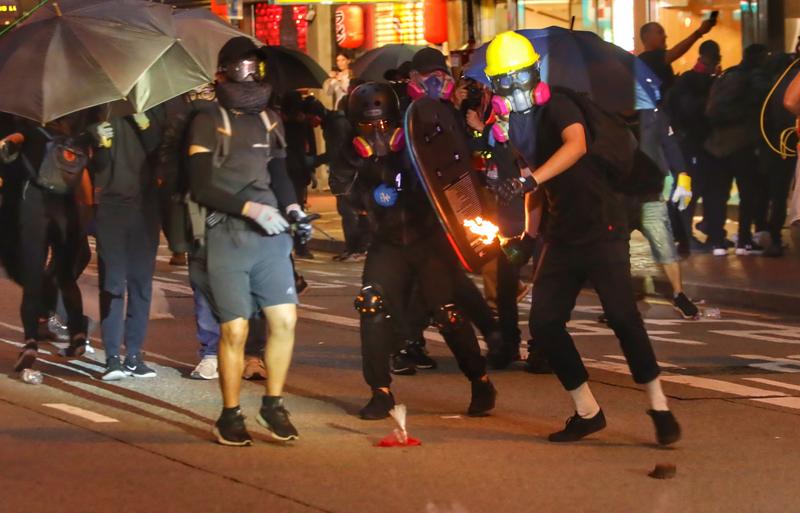Banning masks a good way to restore law, order


Hong Kong Chief Executive Carrie Lam Cheng Yuet-ngor's announcement on Friday that the Hong Kong government was banning facial coverings by those participating in public meetings, processions, unlawful assemblies or riots is a move in the right direction.
Violent protesters have been relying on anonymity to protect themselves from the consequences of their crimes. The prohibition may give some of them pause for thought.
Similar measures have been adopted around the world, and have proved effective. In the United States, for example, the state of New York adopted a face mask ban for participants in public protests as early as 1845, in order to promote public safety, with some other states following suit.
In 2013, Canada forbade the wearing of face masks by those involved in riots and unlawful assemblies, and introduced an associated offense of wearing a mask with the intent to commit an indictable offense.
The emergency regulations ordinance under which the prohibition has, as the Prohibition on Face Covering Regulation, taken effect in Hong Kong was enacted in 1922. It is a well-established tool for dealing with grave public order situations. The Basic Law stipulates that pre-1997 ordinances "shall be maintained", unless they "contravene this law". The emergency regulations ordinance clearly does not.
Although some people have claimed that the chief executive does not have powers under the Basic Law to declare a state of emergency, Lam said at her news conference that she was not in fact doing this. The emergency regulations ordinance empowers the chief executive to put in place an emergency regulation in the public interest because of a particular public danger.
On Sept 29 and Oct 1, radical protesters lobbed gasoline bombs, attacked police officers and vandalized subway stations and other public property. Therefore, in order to address an existential public danger, the regulation is legally justified.
The fundamental rights and freedoms contained in the Basic Law and the Hong Kong Bill of Rights Ordinance are in no way affected by the prohibition.
Any human rights impact of the prohibition will have been carefully assessed by the Department of Justice's Legal Policy Division, which is aware that the rights of freedom of expression, peaceful assembly and privacy are by no means absolute. They may be subject to restrictions that satisfy the "proportionality test".
As the secretary for justice indicated last week, the Hong Kong Court of Final Appeal, in two landmark judgments, has decided that whenever government decisions are challenged on the basis that they contravene particular rights, a fourfold proportionality test should be applied by the courts.
First, the impugned decision must have a legitimate aim. Second, it must be rationally connected to that aim. Third, any restriction must be no more than is strictly necessary to achieve that aim. Fourth, the court must examine the overall impact of the impugned measure, and decide if a fair balance has been struck between the general (public) interest and the individual rights intruded upon.
Under the Basic Law, it is the function of the Legislative Council to scrutinize legislation, and it cannot be bypassed. That is why the regulation, as subsidiary legislation made by invoking existing legislation (the emergency regulations ordinance), will be presented for scrutiny at the Legislative Council at the first meeting of its new session, on Oct 16.
If the council so wishes, it can then, by resolution, and by virtue of the Interpretation and General Clauses Ordinance, amend the regulation. This includes the power to "repeal, add to or vary" the subsidiary legislation. Although any such "negative vetting" does not have a retrospective effect, it must be exercised within 49 days of introduction.
While it will not be possible to prosecute every offender under the regulation, particularly when the numbers are large, there is certainly no safety in numbers. In 1992, the Court of Appeal decided that it is not open to a defendant to resist prosecution on the basis that other suspects have not also been charged with the same offense. Anyone who deliberately breaks the prohibition law is, therefore, liable to prosecution.
Although some people have sought to sensationalize the prohibition, it is a recognized tool of law enforcement around the world. It is a mild response to a grave situation. If it does not do the trick, far tougher measures will be unavoidable.
The author is a former director of public prosecutions for Hong Kong. The views do not necessarily reflect those of China Daily.
(China Daily Global 10/09/2019 page1)
- Guangdong urged to drive high-quality development
- Shanghai hosts 6th intl 3E talent fair
- Xi's special envoy attends inauguration of Bolivian president
- Countdown to 15th National Games: On-site warm-up entertains audience
- Eight missing after cargo ship collides with fishing vessel near Shandong
- Investing in people: a worthwhile investment





































